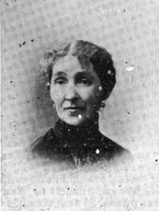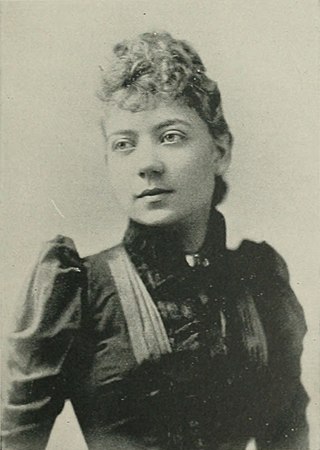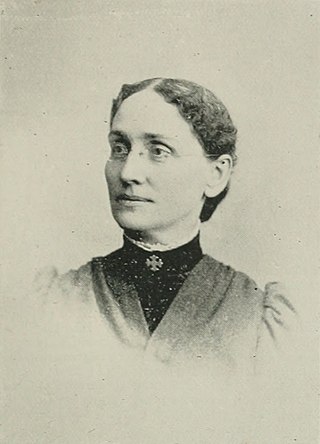Related Research Articles

Mary Anne Sadlier was an Irish author. Sadlier published roughly twenty-three novels and numerous stories. She wrote for Irish immigrants in both the United States and Canada, encouraging them to attend mass and retain the Catholic faith. In so doing, Sadlier also addressed the related themes of anti-Catholicism, the Irish Famine, emigration, and domestic work. Her writings and translations are often found under the name Mrs. J. Sadlier. Earlier in her career, from 1840 to 1845, some of her works were published under the name "Anne Flinders".

Carlotta Perry, the pen name of Charlotte Augusta Perry, was an American writer of poetry and prose. She was among a group of premier women poets of the late 19th century. Her poems, children's stories, and short stories were published in many of the most read publications of the time including Harper's Magazine, Godey's Lady's Book and Lippincott's Monthly Magazine. Some of her verse can still be found today in Christian newsletters and even in an ad for a paint company describing their shades of white. Known mostly for her poetry, she was also a journalist and was active in many of the journalism and women's organizations during her working life.

Velma Caldwell Melville was an American editor, and writer of prose and poetry from Wisconsin. She served as editor of the "Home Circle and Youths' Department" of the Practical Farmer of Philadelphia, Pennsylvania as well as for the "Hearth and Home Department" of the Wisconsin Farmer, of Madison, Wisconsin. She was one of the most voluminous writers of her time in Central/Western United States publications. Melville wrote several serials, and her poems and sketches appeared in nearly 100 publications.

Marion Juliet Mitchell was an American poet and educator. She received a thorough education, and inherited literary tastes from her parents. She contributed extensively both prose and verse to magazines and was the author of a volume of poems. Her poems appeared in several standard collections. Mitchell died in 1917.

Henrietta Gould Rowe was an American litterateur and author of the long nineteenth century.

Ruth Ward Kahn was a Jewish American lecturer and writer. In addition to being the author of novel, The Story of Judith (novel), The First Quarter, and "Gertrude", she was a contributor to Woman's Home Companion, Arena, Popular Science, and other publications. She was a member of the Incorporated Society of Authors of London, as well as the Woman's National Press Association, of which she served as the vice-president for its Colorado branch. Kahn's travels took her to Bermuda, Mexico, Hawaii, and the South Sea Islands; she lectured in 20 states.

Elizabeth Otis Dannelly was a 19th-century American writer of Southern poetry. Born in Georgia, she was the author, Cactus, or Thorns and Blossoms and Wayside Flowers.

Laura J. Rittenhouse was an American temperance activist, juvenile literature author, poet, businesswoman, and club-woman of the long nineteenth century. She was the author of the poem, "Out of the Depths".

Alice Mary Dowd was an American educator and author. She was born in Virginia in 1855 and began teaching at the age of seventeen. Dowd taught for more than three decades before retiring in 1926, having had experience in almost all phases of the work, including district school substitute, evening school, private school, high school, college, and Sunday school. Besides numerous uncollected poems, she published a volume entitled Vacation Verses in 1890. In 1906, she published Our Common Wild Flowers. With her sister, Luella Dowd Smith, she co-authored another book of poetry, Along the Way, in 1938. Dowd was an occasional contributor to papers, and at one time, a regular contributor to the magazine edition of Pasadena News. Dowd died in 1943.

Maude Gillette Phillips was an American author, educator and animal welfare activist. She was the author of Popular Manual of English Literature. Phillips was a prolific writer for magazines in fiction and criticisms under pen names. Known for her wide social experience, she seemed to be more a woman of the world than a scholar or author.
Eva Anne Madden was an American educator, journalist, playwright, and author. She was one of the first women newspaper journalists of New York City.

Agnes Leonard Hill was an American journalist, newspaper founder and publisher, as well as an author and poet, an evangelist and a social reformer. Born in Louisville, Kentucky, her mother died when Hill was a small child, and with her father remaining unmarried, and very indulgent, Hill led a roving, gypsy sort of life, following her own inclinations, and studying persons rather than books. From earliest childhood, she evinced a fondness for writing.
Fanny Murdaugh Downing was a 19th-century American author and poet. She was the first resident novelist of Mecklenburg County, North Carolina. Downing's principal publications included: Nameless, a novel, 1865; Perfect though Suffering, a Tale, 1867 ; Florida, a Tale of the Land of Flowers; Pluto, or the Origin of Mint Julep, a story in verse. Most of her poems described her love and devotion for Confederate soldiers. In addition to Pluto, her best known poems were "The Legend of Catawba" and "Dixie".

Myra Douglas was an American writer and poet. Starting in her childhood, she wrote stories and verse for The Waverly Magazine and Literary Repository and Ballou magazine, both of Boston, and other prominent periodicals. Her poems were included in nearly all standard collections of American verse.

Katherine Van Allen Grinnell was an American lecturer, author, and social reformer. She was one of the first women in the United States to lecture and write on the place of woman in the scheme of government. Grinnell attained an international reputation and was praised by Frances Willard, Susan B. Anthony, Lady Somerset, and others.

Lida Rose McCabe was an American writer, journalist, and lecturer. She is remembered as the first woman reporter who traveled to the Klondike. Her first book, Don't You Remember? (1884) was a reminiscence of Columbus, Ohio's early days. In the midst of an active newspaper life in New York City, she found time for the writing of other books, including The American Girl at College (1893) and Ardent Adrienne: The Life of Madame de La Fayette (1930), as well as magazine articles. McCabe contributed to the Popular Science Monthly, Lippincott's Monthly Magazine, McClure's, The Cosmopolitan, St. Nicholas Magazine, Book Buyer, The Outlook, The Bookman, and Town & Country, and syndicated all leading newspaper in the U.S. and abroad. She was also Paris correspondent for the New-York Tribune and the American Press Association (1889–90).

Leora Bettison Robinson was an American author and educator of the long nineteenth century. Together with her husband, she established the Holyoke Academy of Louisville, Kentucky. She was the author of The House With Spectacles, Than, Patsy, and other works.
Theodora R. Jenness was an American children's author, editor, and clubwoman who spent many years doing missionary work in South Dakota. In addition to publishing several books between 1879 and 1917, she also contributed short stories and serials to magazines. Jenness died in 1935.

Jeanette DuBois Meech was an American evangelist and industrial educator. She was well known as an evangelist, who married a Baptist clergyman.

Euphemia Johnson Richmond was an American litterateur and author of novels and children's literature. Her early sketches, published in periodicals, were under the pen name, "Effie Johnson", but her later work was under her own name styled as "Mrs. E. J. Richmond".
References
- ↑ "Current Literature". Current Literature Publishing Company. June 3, 1896 – via Google Books.
- ↑ Kinkead, Eleanor Talbot (1898). "Florida Alexander, a Kentucky Girl". A.C. McClurg. Retrieved 28 August 2020.
- ↑ Smith, Geoffrey D. (August 13, 1997). American Fiction, 1901-1925: A Bibliography . Cambridge University Press. p. 376. ISBN 978-0-521-43469-0 – via Internet Archive.
Eleanor Talbot Kinkead.
- ↑ Herringshaw, Thomas William (June 3, 1914). Herringshaw's National Library of American Biography: Contains Thirty-five Thousand Biographies of the Acknowledged Leaders of Life and Thought of the United States; Illustrated with Three Thousand Vignette Portraits ... American Publishers' Association. p. 424 – via Internet Archive.
eleanor talbot kinkead Herringshaw's.